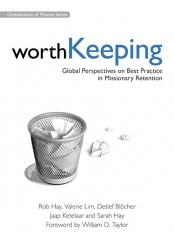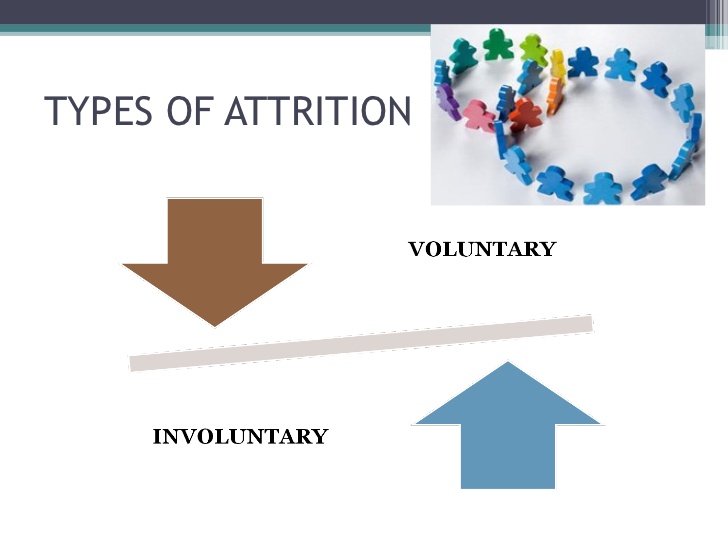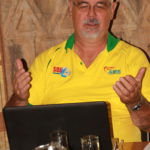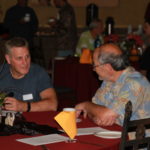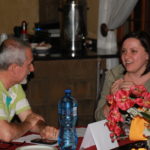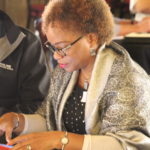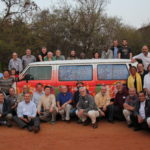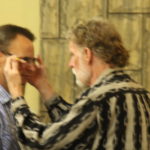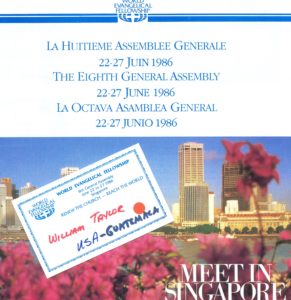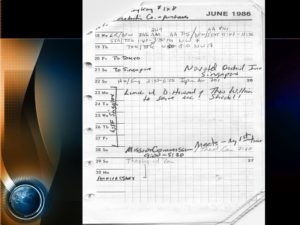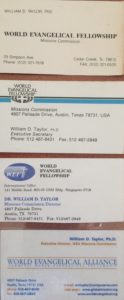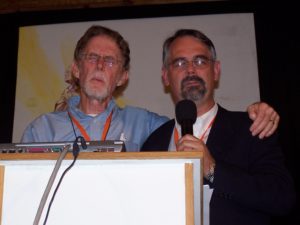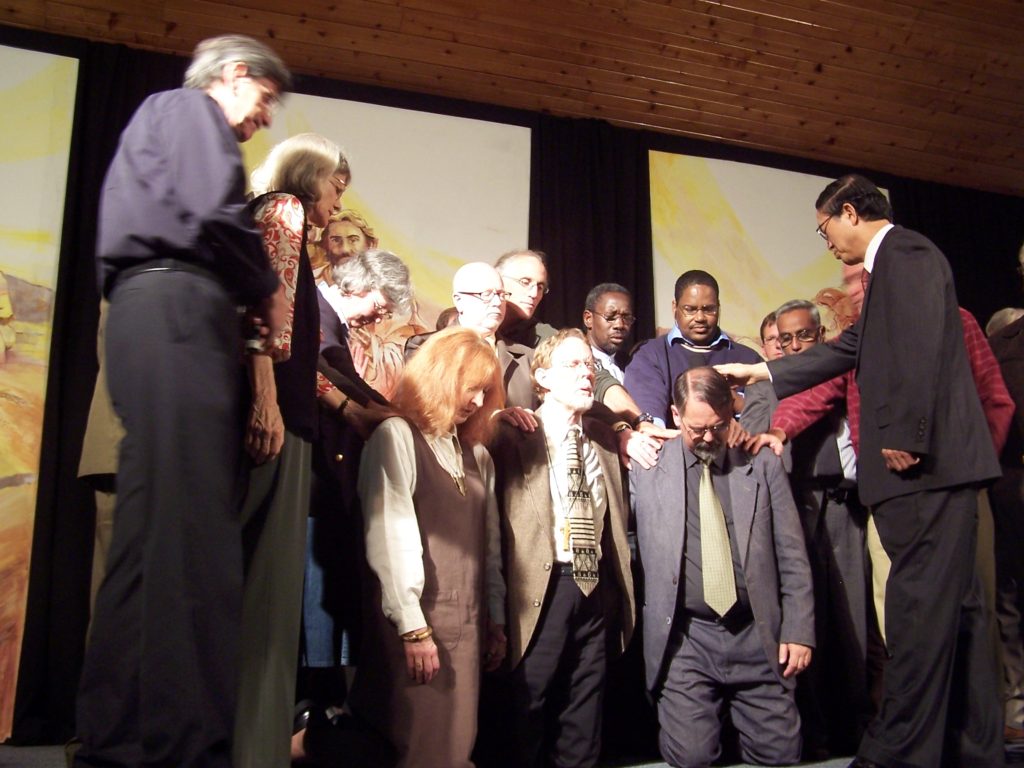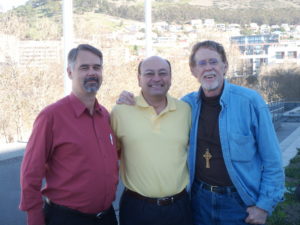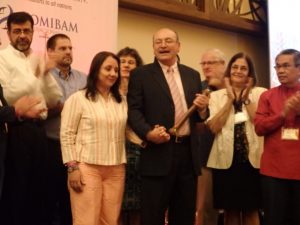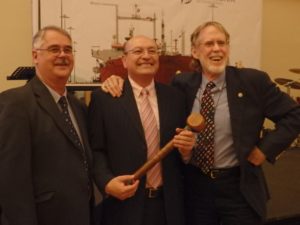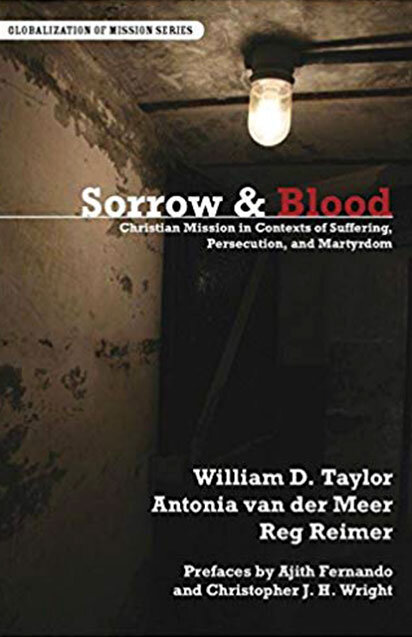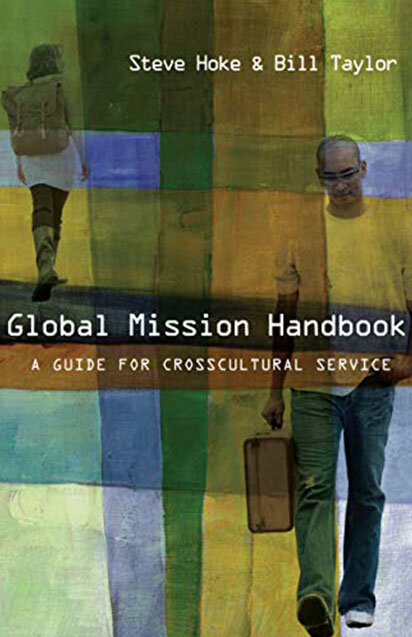(These are some additional reflections that led me to write this resource.)
April 15, 2025
Crucial to my understanding of leadership is described in the terms, “leading from below.” It follows the contours of the “downward path of the cross.” It contrasts sharply with the dominant view of secular leadership and seen in too many evangelical circles. “Leadership from above,” tends to emphasize strong personal initiative, individualism, central authority, and metrics that lead to measurable results. Almost all Christians and many seculars will speak of servant leadership, yet too few allow it to become a prime driver.
All leaders, even top-down ones, must learn from leading from below, making significant changes in their style to serve more commendably and collegially. This requires listening, assuring there are viable and periodic mechanisms of feedback where the leader truly pays attention and heeds the feedback from the rest of the team or the board. This kind of leader is willing to change course without losing integrity and is not defensive or self-protecting…
My audience will be a diverse set of leaders. I write for missionaries from everywhere to everywhere. All of you will be leaders in some sense of the word. I write for tested (and wounded—whether by others or self-inflicted) servants of my generation and younger. You have experienced some of this “stuff ” and have learned your own lessons. You have your unique scars. I speak also to those in the earlier stages of leadership or about to enter new arenas of influence and direction. I see another group of leaders who may be in that transitional leadership topography where you are about to move into a new space with new responsibilities. You both need and must ask the Spirit’s presence and wisdom. There are also former leaders who were unable to transition into another uncertain future, or who withdrew from leadership, or perhaps did not finish as well as desired.
I have in mind local church mission leaders, especially those who determine the fates and finances of their field partners. I am also keenly interested in that cluster of readers who have not been in recognized leadership and who wonder “Why did that person get the position?” Perhaps you are one who was wounded by leadership. I know what that’s like. While I do not write for the academic or leadership specialist or theoretician, I do write for students of leadership in both formal and nonformal academic worlds. Finally, I write for the leader in the last laps of life, perhaps en route to becoming a tested person of maturity and wisdom.
Whatever the category of leader, I write for all, with colleagues and friends in every set. I have found myself in different categories throughout my life, as do many others. Instead of exploring leadership theories, this book invites readers into personal stories of family and service, transitions and change, wounds and laughter, mistakes and maturity, all drawn from my long decades in cross-cultural service.
The photographs. 1. My first home, Turrialba, Costa Rica, next door to Evangelical Chapel my father pastored. 2. Little Billy, circa age 7 (?) with his big Bible; home in Guadalupe de San José, Costa Rica
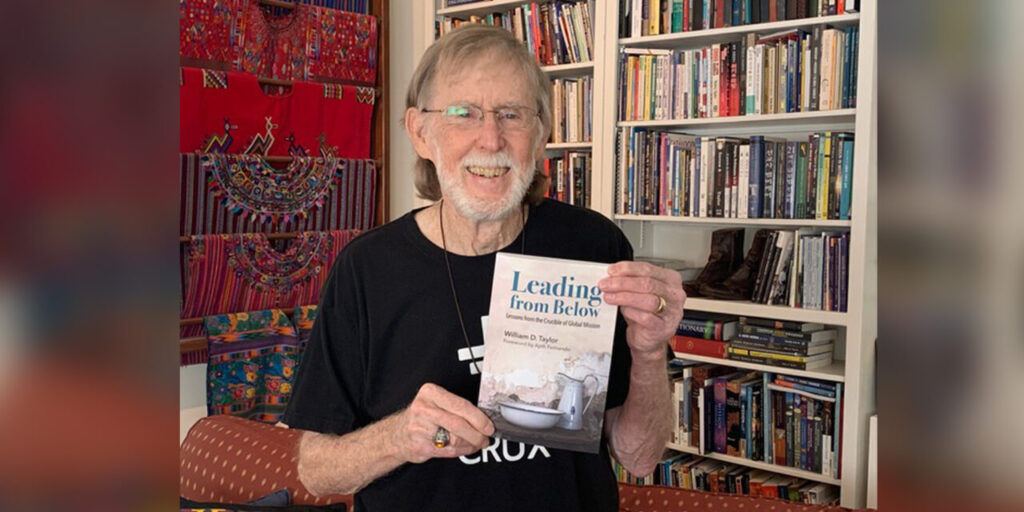
TheGlobalPilgrim, Bill Taylor blog: reflections from 60 ministry years, my stories, narratives of people and prayer, mistakes and tears, wounds and scars, joy and hope, growth and change—with the passion to finish well.
April 7, 2025
These are some of the swirling reflections that led me to write this resource:
Part I
I’m unimpressed with Christian leadership literature that focuses on influence, executive positions, measurable objectives, strong numbers, success, reaching your goals, or “learning from the giants, the great leaders”; I am much less impressed by the ones that offer me success if I apply their ten or twelve or fifteen crucial leadership steps. “Buy your successful leadership package, on-line, discounted.” I deny there’s an easy path to gifted, efficient, godly, global leadership, much less a successful Spirit-filled life. God doesn’t work that way. The true north perspective of the authentic Christian leader must be marked by the cross. But too many of us have been influenced and misshaped by contemporary culture. Leading from below puts little weight on those popular success principles and stories, though it can learn from them—particularly the negative lessons.
Christian leadership books address these issues diversely. A few are narrative in structure; others are very pragmatic. Some focus only on biblical models, with Jesus the prime example. Others contribute by studying the broader nature of leadership. Some authors even include their academic degree in the title. Why? Others take secular and modern culture models then baptize them with Christian language and application. Some collect the stories and testimonies of “great and successful” Christians in business and industry, in the military and academy, in the church and its institutions. They smack of “triumph only” results, or “data-driven decisions,” skirting too close to Christianized secular (perhaps American or British, perhaps Singaporean or Korean, perhaps Nigerian or Brazilian) values…
As thoughtful evangelicals, I believe we listen to three primary wisdom fountains about leadership: First, Scripture; second, the historic lived experience; third, resources from those who have grappled with these issues—whether from a Christian worldview or not. However, at the end of the day, our understanding of Scripture must anchor our convictions on leadership issues. Note just three New Testament lessons. Jesus invested in a diverse band of potential leaders, creating a three-year nonformal learning community for them—including his later betrayer Judas. Second, Paul gives us clear guidelines about local church leadership in 1 Timothy 3:1–7 and Titus 1:6–9. Might these requirements apply when we evaluate future missionaries regardless of age, gender, or life stage?
Should we reference these norms when appointing any person to leadership—woman, or man, younger or older? How might that change things? Finally, James warns us (3:1), “Not many of you should become teachers, my brothers, for you know that we who teach will be judged with greater strictness.” Each of us who seeks to be a leader should consider these words deeply and with constant care….
My definition (of leadership) emerged organically from reading, hearing, observing, and experiencing leadership. “The leader is one who provides a vision of a preferred future and invites-gathers-empowers others to participate in that vision.” Thus, leadership combines natural and spiritual gifts, training, and purpose to cast vision, inviting followers to join that venture. I apply it equally to women and men. And I believe it fully embraces all leadership categories. This definition releases initiative, creativity, and courageous leadership.
Part II coming in 10-15 days
Engaging the year of my 85th birthday, I have been mulling over the following questions:
1. Who am I now? After 60 years of crosscultural mission and a richly diverse life of vocational service.
2. What does God call me to be? These are the rock-bottom realities of life, and my life. In essence He calls me to live as a beloved son, and a Jesus lover who longs to finish well.
3. What does God call me to do? Ah, this is different, but also a deal-breaker. As I review my last ten years of life and work, I realize the journey has become fuller and more challenging. While I used to “do” a lot of things, now, today, in the fullness of my 84th year, things are different. Yesterday, reading the opening page of my web site, TaylorGlobalConsult.org it is clear that some of the good things that marked me before, do not now. The now is different, and rightly so.
So how do I self-identify, or what am I do now? For the first time in my life I am self-identifying as a writer, a mentor and a friend of the CRUX Institute, that newish and so creative apologetics platform based in Guatemala, staffed by a multi-national team, and already having an impact far beyond expectation.
Bill Taylor, the Writer
For nearly 36 years, starting in Guatemala before we moved to the USA in 1985, my passion as a writer was to ask others to write with me, to share the task and the benefits of writing. My co-authors were Latin Americans, and I was a satisfied writer. Then for 30 years with the WEA Mission Commission, my calling was to “Publish Global Voices to Address Global Issues”. That meant I was more of an editor.
However, in early 2017, as those three decades concluded, I sensed the Spirit nudge me, quietly saying, “Well done, Taylor. But NOW I release YOU to write from YOUR heart.”
Fast-forwarding to today
Earlier this month William Carey Publishers released my book, “Leading from Below: Lessons from the Crucible of Global Mission.” And that gives direction and content to this blog. I want to feature segments of the book, in the order they emerged in written form. Select photographs will illustrate. The affirmation of the women and men who endorsed the book will be identified.
And I shall continue writing on this blog.
Welcome good reader, and may these musings, reflections, stories and more encourage, stir and stimulate you to follow Him, Jesus our Christ until the journey is over–the one on planet earth that is.
Bill Taylor, Writer


September 11, 2017
I finally return to this series on attrition, defined again in its broadest sense as “departure from field service by missionaries, regardless of cause”. My personal prime concerns related to attrition address the specific causes of premature, or earlier than expected, or hard-to-explain, or painful departure from cross-cultural field service of longer-term workers—those at significant geographic distance from the sending base or home church.
finally return to this series on attrition, defined again in its broadest sense as “departure from field service by missionaries, regardless of cause”. My personal prime concerns related to attrition address the specific causes of premature, or earlier than expected, or hard-to-explain, or painful departure from cross-cultural field service of longer-term workers—those at significant geographic distance from the sending base or home church.
Yes, it’s complicated but so are people and that’s the way things are.
So over 20 years ago when the WEA Mission Commission team launched ReMAP I—the 14 nation study of attrition of longer-term missionaries—we simply did not have an idea even of the general topography of missionary attrition, much less on an international or global scale. That made ReMAP I a unique and challenging cross-cultural research project. It’s strength was also one of its weaknesses: we really only had hard access to the sending agencies (and some significant ones declined to participate in the study) of the 14 nations. It was virtually impossible to get responses from the thousands of sending churches or independent “self-sent” workers. However we do have scores of case studies that affirm the core results of ReMAP I.
Again, the driving question was this: Why are so many good people returning earlier than expected from longer-term cross-cultural ministry? They went out with high hopes, but something happened, and now they have returned, many of them discouraged and confused, all of them hurting.
At the end of the study, when all the data was evaluated, it seemed that we could reduce these three cluster factors as crucial:
Issues related to spirituality; for example, understanding of “call”, of the cost of cross-cultural ministry, of the need for serious pre-field equipping;
Issues related to relationships; for example, getting along with spouse in cross-cultural pressures, with leadership, with colleagues and with national leaders;
Issues related to pre-field equipping; in other words, the absence or inadequate pre-field equipping for cross-cultural service, especially intentional formal and nonformal training centres, and in particular the equipping that combines the strengths and resources of the home-sending church with those of the training centers.
But it’s a new world out there and things are going upside down or topsy turvey!
In the next post I want to drill deeper into these three clusters, but the question I ask myself now is this. Would these three prime issues explain attrition today? Nobody knows. Since our follow up study resulting in the book, “Worth Keeping”, we have seen little interest in the topic and certainly no studies that we know of.
Why would this be the case, and what truly IS the attrition reality today? Well, it certainly is different, and at least for these reasons.
First, more and more the mission movement is driven by the local church, and in so many cases this is healthy. But there are dangers, especially when the local church—regardless of its size, thinks it can “do it all by ourselves”. The local church mission movement is independent, autonomous, has less personal history in mission and much less institutional memory. In my 55 years of mission service I have seen so much change of church mission leadership, with close to zero interest in the past.
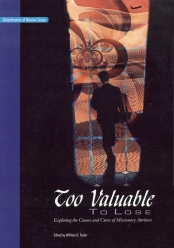 Second, I sense a growing acceptance as normal mission service, and even to call what we used to call “short-term” service to become middle-term or even long term. I had an astonishing conversation with one young missions mobilizer who spoke to me of six months being long-term. What?????????
Second, I sense a growing acceptance as normal mission service, and even to call what we used to call “short-term” service to become middle-term or even long term. I had an astonishing conversation with one young missions mobilizer who spoke to me of six months being long-term. What?????????
Third, mission itself is being re-defined, and in many cases for the good. I am grateful for the elimination of the old dichotomy of “home” versus “foreign” mission. One of our former supporting churches had a mission team leadership change and we were categorized as either “domestic” and “international” workers. Since we lived in Austin we were slotted into “domestic”, and it took two years for me to negotiate a return to “international”, and we had to apply all over again for basic support. Something’s wrong with that picture!
On the good side, I see churches crafting a mission policy statement that takes their own Jerusalem—their city—into serious consideration. But of the 15 churches or so where I have had the privilege of helping write such statements, only the last one took the city seriously.
I am glad to see the elimination of the other dichotomy between “evangelism and social concern”. In Scripture and mission history they have all been intimate partners, but for too many years the American mission movement separated them. So now we witness more ministries of compassion and justice coupled with Gospel and church planting. This is healthy and encouraging. It also sits well with crucial Biblical passages like Luke 4 and the Nazareth Manifesto.
However, we must come to grips with new challenges, especially impacting our younger adult future servants.
Fourth, and here we shift a bit. The mission movement in the Global North (I am hesitant to speak on Global South realities related to this face of our landscape) nations is grappling with a new set of cultural, philosophical and theological changes. Tectonic shifts, thanks to post-modernity and the new religious pluralism, plus the breakdown of the family mean that so many of our candidates come to the mission service threshold with serious internal unsettleness in relation to gender and radically dysfunctional family systems. We are challenged with the problem of protracted adolescence, where young adults are taking longer to make key decisions. So many of them come from divorced families and are speak of an openness to re-define what it means to be human and marriage. “My gay friends truly love each other. Is it not their human and civil right to enjoy marriage? So what? Look at my parents? Let’s give full marriage to whoever do love the other.”
Ah, I groan at this one.
Fifth, let’s toss in another more contemporary attrition cause—pornography. And it affects not only men (as would be commonly expected). Christian women are trapped into the addiction. Actually, I first heard of porn causing attrition right about the year 2000. That would be when Internet access exploded around the world. Men and women could then watch it in secret in even the most so-called isolated places of the world. Women represent 30% of the visits to “erotica”; in some cases it’s defended as an affirmation of their feminist stance. But this fantasy exacts a deadly price.
Sixth, as profound as these are, honestly, my deeper concerns have to do with the ambivalence and uncertainty regarding core Biblical and theological issues. My younger friends ask: “So can Jesus be singular without being unique? What’s the difference between ‘singular’ and ‘unique’ anyway? Does Christ have to be the only way? What will God do with good people (like my friends who are sincere Muslim or Buddhist or Shinto or animists or Hindu at the Great Judgment? Do we need a Great Judgment anyway? It’s so unfair!”
Many of our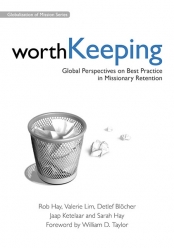 choice young adults are thrilled with the magnificent pictures of worship in the book of Revelation. They are challenged by steadfastness under persecution in that apocalyptic book. But they would rather not deal with the equally powerful reality in John’s writing that has to deal with eternal judgment and the reality of eternal separation from God.
choice young adults are thrilled with the magnificent pictures of worship in the book of Revelation. They are challenged by steadfastness under persecution in that apocalyptic book. But they would rather not deal with the equally powerful reality in John’s writing that has to deal with eternal judgment and the reality of eternal separation from God.
But are these the same young adults that come to our mega conferences, whether an Urbana, a Passion conference or the One Thing celebration in Kansas City? Have the leadership of these three giga-discipleship and mission celebrations done any kind of in-depth evaluation of where our beloved younger adults stand in terms of Truth? Hmnmm, might that be a challenge to consider?
OK, enough for now! This is sufficient for me, the writer, to mull over for some time. Ah, not incidentally, I was a participant of the recent COMIBAM mission congress in Bogotá, Colombia. I bumped into the Brazilian publisher of the Portuguese edition of “Too Valuable to Lose” and he surprised me, when he said, that book continues to be a best seller and we want to produce a new edition. What are your thoughts? I affirmed him and suggested that they update it with some new chapters and a new foreword and introduction. That was a nice touch for a book now 20 years old!!
When we return we will explore the three cluster issues of attrition and apply them today.
Thoughtful reading for all!
The wisdom of Humpty Dumpty
I’m reminded of some thoughts that come from a discussion held a long time ago between Alice and Humpty Dumpty on the meaning of words.
“When I use a word”, Humpty Dumpty said, in rather a scornful tone, “it means just what I choose it to mean — neither more nor less.”
“The question is,” said Alice, “whether you can make words mean so many different things.” “The question is,” said Humpty Dumpty, “which is to be master — that’s all.
Alice was too much puzzled to say anything, so after a minute Humpty Dumpty began again. “They’ve a temper, some of them — particularly verbs, they’re the proudest – adjectives you can do anything with, but not verbs – however, I can manage the whole lot of them! Impenetrability! That’s what I say!”
“Would you tell me, please,” said Alice, “what that means?”
“Now you talk like a reasonable child,” said Humpty Dumpty, looking very much pleased,
“I meant by ‘impenetrability’ that we’ve had enough of that subject, and it would be just as well if you’d mention what you mean to do next, as I suppose you don’t mean to stop here all the rest of your life.”
“That’s a great deal to make one word mean,” Alice said in a thoughtful tone. “When I make a word do a lot of work like that,” said Humpty Dumpty, “I always pay it extra.”
“Oh!” said Alice. She was too much puzzled to make any other remark. (Carroll 1987: 106, 109)
And that’s the way I some times feel about the term “attrition”. It’s a valuable word, but do we pay it extra to mean more than it means? Perhaps so. Perhaps not. During the 90’s the WEA Mission Commission team carefully examined this issue, nationally and globally, comparing what we called Older Sending Countries” with “Newer Sending Countries”. The follow-up study, led by a different team, examined carefully issues related to attrition in light of agency and church best practices.
One discovery was that the term, around the globe where it was being analyzed, had become a weighty and valuable one, with enormous meaning and expanding implications. So we ended up with this working definition:
We define attrition in its broadest sense as departure from field service by missionaries, regardless of cause. However, our prime concerns related to attrition themes speak to the causes of premature or painful departure from field service. We discovered major attrition variants between Newer Sending Countries (NSC) and Older Sending Countries (OSC).
Categories of attrition
We can understand “acceptable” attrition that comes from normal retirement, issues related to children (although some of these are a cover for parental unresolved conflicts), a legitimate change of job, health problems, political crisis, contract conclusion. The first four were the top reasons for North American missionary attrition, though there are others. Generally the Western mission movement is an aging one, contrasted with the chronological youth of the non-Western movement.
There are attrition causes we feel are “preventable”, such as lack of home support (financial, prayer, other), problems with peers, personal concerns, lack of call, poor cultural adaptation and a cluster of others that came up in our research. It was these that we felt could be dealt with prior to field service as well as during field service.
Then there’s attrition that should happen but doesn’t! The fact is that some missionaries stay who should leave, and the sadness is that their staying makes some of the best people leave. Not all attrition is bad. It can be a healthy thing to send missionaries home who should not be allowed to stay on the field. But this requires courageous, pro-active leadership from the agency or responsible church. It also points out a major structural problem faced particularly in sending agencies.
Most mission agencies (whether churches, denominations or independent societies) keep going and apparently relevant, based on the number of live missionary bodies…and their finances. So when a person comes with an apparent “call” to missions, the potential to raise support, and somehow fits in the mission agency, they tend to get in. And some cannot be removed!! We have seen this in too many cases. In my experience few leaders have the courage, and authority, to, essentially, remove these dysfunctional, toxic, un-gifted, but well-supported workers.
Fourth, there is that attrition that, though painful, is applied for the good of all and it’s the right and good thing. In some cases a missionary family will conclude this by themselves. A colleague was visiting some missionaries in Africa recently and found that the family had a copy of the book Too Valuable To Lose. To my friend’s surprise, they told him that reading the book had led them to face the obvious—they were not to stay on the field for a number of honest reasons.
The other side of this coin is when mission leadership acts wisely and boldly and brings/sends home a family. Regardless of how this takes place, the role of the “”flow of care” is crucial, with the sending society and home church taking the lead to ensure the best return and reintegration into a gainful vocation in the passport culture.
Finally, we discovered a new category, those vulnerable to attrition. Our original study in Australia discovered two vulnerable groups. One was the missionary wife who in her home culture had her known identity, her own skills and a personal vocation. But on the “field” the picture had changed radically. What and who she was then came under stress, especially if the mission culture and national church had a different understanding of a woman’s giftedness and spheres of ministry.
The second vulnerable group included people who expected to do a certain thing in mission service, but upon arriving found no such job description, or discovered that the promised job had been transferred to another or had been phased out without informing the home-based agency office and personnel.
Yes, both Alice, the insightful one, but also Humpty Dumpty were right. “That’s a great deal to make one word mean,” Alice said in a thoughtful tone. “When I make a word do a lot of work like that,” said Humpty Dumpty, “I always pay it extra.”
Attrition, a good word, a challenging word. And in our next posting, we will see how today’s radically changing mission landscape is changing the understanding of cross-cultural servant attrition.
On the term, “missionary”
This “M” word has fallen on rather hard times, and I understand some of the reasons. It’s overused and outdated—“it sounds SO colonial”. It has been victimized by reductionism and so generalized, “everybody is a missionary” (with the corollary that if everybody is one then nobody is one, the confusion between “witness” and “M”), and thus has lost currency. Other terms have been helpfully introduced, and I use them in various contexts: cross-cultural servants or workers; servants on mission; longer-term cross-cultural servants; and I can even risk this one, “lifers in cross-cultural mission”. But at the end of the day, I return to the original “M” word, the missionary. Let me try to define this person to help us all understand what I’m talking about.
Here I quote myself from Global Mission Handbook, where Steve Hoke and I presented an apologetic for the term.
“Missionary is not simply a generic term for all Christians doing everything the church does in service to the kingdom of God. We do a disservice to the term by universalizing its use, oversimplifying a rich vocabulary and theology of gifting and vocation. While all believers are witnesses and kingdom servants, not all are missionaries. While all believers must be committed to and involved in mission, not all are missionaries. We do not glamorize nor exalt the missionary, nor do we ascribe higher honor in life or in heaven, nor do we create an artificial office. In an attempt to get away from the old, worn-out images of “missionary,” some of our good friends are introducing new terms, such as “partner” and “crosscultural servants.” No problem! Just be sure you define this key term and concept.
We are committed to a robust biblical theology of vocations (God has given us diverse vocations and all are holy, but not all vocations are the same); a theology of gifts (not all are apostles, nor do all do miracles, 1 Cor 12:29, therefore, not all Christians are missionaries); and a theology of callings (the sovereign triune God calls some to this position and task). These women and men are crosscultural workers who serve within or outside their national boundaries, crossing some kind of linguistic, geographic or cultural barrier in obedience to God”.
Back to attrition and some of the human stories and real dimension of attrition

I never want to forget Betty, whom I met shortly before our 1996 U.K. workshop on attrition. Her young adult face reflected a kaleidoscopic of emotions. She would smile in our conversations, a sweet, gracious, gifted disciple of Christ, preparing for ministry herself. But her eyes never smiled. Permanent pain etched them. As her story poured out, her just anger, hurt and tears ripped through me. Both of her parents were graduates from a premier English “missionary training school”, were accepted by a major mission agency, and supported by friends and churches they traveled to serve in Africa, the classic British “mission field”. But once there, reality emerged and her father revealed himself as a quiet, cruel, violent abuser of his wife. Betty and her younger brother lived it all. But the “family secret” never was unveiled. They returned “home”, crafted a PR statement that satisfied them, their agency and supporters. They resigned from the agency, and then the wheels flew off: the parents divorced, and the family fragmented. Betty’s mother slipped away from faith and in mid-life remarried a non-Christian who ironically truly loved her like her former “Christian” husband never had. The father today is a bitter man, the brother now isolated from the family, angry with all, including God. When Betty heard about our attrition study she asked me, “Do you think your study will help discern what happened to my family and to prevent other similar cases”?
The fact is that our mid-90’s attrition research for me has been anything but exciting, thrilling, filled with joy. There are too many personal stories, now shared very freely when people (including the “attrits”) discover what we were trying to discern in this international, multi-lingual research project. We never wanted simply to do “body counts” nor to major on “failures”—whether provoked by the individual, the family, church, school or agency. We certainly did not want to title our study (as one English researcher did) “Why missionaries quit”. We wanted to go beyond numbers into human lives and church/mission “cultures”, to discern just why we were “losing” so many good people from long-term cross-cultural ministry. We also wanted to discover what kept people in healthy active field ministry. We desired to profile mission agencies and sending churches which did a good job in preventing attrition. This complex task requires them to face their own “home culture” and their own history of attrition in order to provide proper pastoral and member care. We wanted to alert leaders to those vulnerable to attrition and to foster healthy change within the mission culture and structures.
I have been greatly encouraged by personal stories of young and veteran missionaries who have hung in there over the years, regardless of difficult circumstances. Recently a most gifted single woman serving in Central Asia spent the better part of a day in our home. We had prayed her to the Muslim world years ago, and now she was back on her first home leave. Hers was a multi-layered story of tensions with co-workers, personal grief, a broken heart when a romantic relationship dissolved, the difficulty of language learning and cultural adjustment, and ministry as a single women in an Islamic culture, and even changing mission agency while on the field. To our astonishment, she desires to return!!! What is it that keeps such a person on the field while others with less-difficult situations withdraw from cross-cultural service?
Drawing to a close
Attrition is a multi-faceted creature providing touches of dark humor, personal reality checks, painful stories, as well as forcing churches, training schools and mission societies into serious self-evaluation. A colleague from the South Pacific passed on a touch of black humor on this subject. He told me that of the first five missionaries to the Cook Islands, two left the field (attrition), one went native (assimilation) and two were eaten (nutrition). I was told that the Solomon islanders ate one missionary but had a hard time with the shoes. They kept cooking them but never got them tender enough to eat! Yes, this is morbid, but it happened!
Next: on other terms and surprising findings from ReMAP I—the 90’s study.
June 16, 2017
Posting 1: Of stories and icebergs

A story
How can I forget that young missionary family in Latin America? He was a missionary kid who had returned to his beloved region with a younger wife and a little girl, and his wife expecting her second. He had dreamed since age 8 that he would be a missionary, and having made that decision, it turned around and shaped his own life. Her radical decisions were made as she finished high school, with the commitment “Anything, anywhere, any price”. When she fell in love with that guy, it meant for her truly leaving home and family, language and culture, the known for the unknown, the orderly for the disorderly. In some senses, she was the “true missionary” just on personal cost. All love.
Finally, for him, after three years of Bible school, a university degree, four years of seminary, and a term of staff ministry with Inter-Varsity, they were off “to the field”, to his “home and language”. Little did he know what he would encounter when his idealized expectations faced reality, or that his dreams would be torpedoed in their first term. Nothing that happened to them could have been found in the “small print of the life-contract” of mission service. He had never heard of the term, “toxic leader”. He had never experienced anything like that before, and from a former friend. Towards the end of the first term he was absolutely worn down, and on the cusp of throwing in the towel and facing a defeated return to his “passport culture” (certainly not his “home country”). He was on the precipice of failure and shattered dreams. Ironically his wife, with no cross-cultural experience, lived her life out of a calm center, focused on God’s character. He was neither calm nor focused anymore.
Late one night during the worst of that personal and vocational darkness, the doorbell rang. The political situation in that nation was delicate (an understatement as we lived under martial law with curfews). People were not out on the street after 10 PM. To his astonishment he found outside the barred gates of their home a greatly respected veteran mission leader who at that time lived in the USA. “What are you doing here in Guatemala? We had no idea you were coming here.” He simply stated, “I have come”, and said no more, refusing to explain his pithy statement. So into the house he came, kissed the wife, looked in on the sleeping little one, then sat down, and simply asked the young worker, “How are you doing?” The TCP husband broke down, and with his wife sitting alongside (she calm), told his painful story in tears. The veteran listened. He discerned the deeper cries. The couple was six months away from a two-year study leave. The veteran asked whether he could hold on that long. Yes, they thought they could.
The veteran spoke healing and promise. Gradually, new perspectives of hope came into focus. Humanly speaking, God used this man to “save” that young family from being an early case of crushing attrition. Saved by the unannounced random appearance of the mission society president, also known as a beloved visionary shepherd.
Of icebergs and attrition
We all know something about icebergs, those floating ice masses, broken off from glaciers, their largest portion under water, dangerously hidden from view. Missionary attrition reminds us of icebergs. We tend to see only the top-side visible evidence—i.e., missionaries who, for whatever reason, have permanently left cross-cultural service. During 1993-1997, it was my privilege to play a role in a 14-nation study of attrition through the leadership of the Mission Commission, World Evangelical Alliance. Following the research, in mid 1996, a select group was convened at All Nations Christian College in the UK, and in 1997 the book, Too Valuable to Lose: Exploring the Causes and Cures of Missionary Attrition was released.
Our MC leadership team had been reminded again and again of the hidden dimensions of attrition—for example, the “real” reasons why missionaries leave, or the invisible culture of the mission society/agency that clearly affects attrition positively or negatively. We also suspected there were significant differences between what we called then the “Older Sending Countries” and the “Newer Sending Countries”. We would discover significant insights in the Korean study of first term workers. We developed new categories, such as “preventable attrition” and its counter, “unpreventable” or “painful” attrition.
In this series of posting
I want to engage some of my own reflections on missionary attritions. It will start with the introductory thoughts. We will define some key terms. We will summarize those 1996 findings again. We will visit the broader study on retention and best practices that we did a decade later under the team led by Rob Hay (most recently) of Redcliffe College and the 2013 key book, Worth Keeping: Global Perspectives on Best Practice in Missionary Retention.
The first strands of this series comes from my introduction and involvement in the watershed book, Too Valuable to Lose: Exploring the Causes and Cures for Missionary Attrition, which I edited and WCL published in 1996. But as I read and re-read that introduction, I realized that I had changed, the world had changed, and thus our writing to address these issues must change.
Another blog will reference the key people who have shaped my thinking on this topic. And I want to address how the entire set of categories and language of attrition has changed for today. We visit the issues for older-generation, mid-generation, younger-generation workers. We will examine how the global refugee migrations are affecting mission service, and the unique opportunity they offer to present compassion and justice, Gospel and Christian community, a true living out of the Nazareth Manifesto of Luke 4.
Why have I been mulling these issues over all my life? Well, my parents were cross-cultural workers, launched into Latin America in 1938. As I grew up I met other workers, saw them serve, and too many of them seemed (to a child) just to disappear. I never asked questions in those years. But I witnessed a lot. However, during the last 50 years I have pro-actively observed long-term cross-cultural workers come and go, but for many years I never asked the hard questions. I certainly was not aware of the underlying causes (unless they were really obvious to all). So my blog grapples with many case studies, personal observations, readings and the result of the two major WEA MC studies on attrition and retention.
A final personal note.
That young missionary of the first paragraphs? Yes, his name was Bill Taylor, married to Yvonne Christine DeAcutis Taylor. And the mission leader? His father, Dr. William H. Taylor, a visionary shepherd, a man of God. “I have come” has entered the legendary phrases of my life, and that was one of Dad’s preferred modes of speaking to me: short, pithy, unexplained aphorisms. He had NO idea of my brokenness in 1972, and to this day I have no idea why he made the trip to Guatemala. Had the Spirit spoken to him in a dream? Perhaps so.
Next post: probing deeper into attrition heart and reality
May 4, 2017
Dear family and good friends, partners in God’s mission, global colleagues within and beyond the international family of the WEA Mission Commission,
So back to the reflections.
Thanks be to God, some five years ago Yvonne and I were led to start a wee ministry-non-profit entity called TGC, which would become the platform to carry us through approaching vocational transitions and into our own preferred future. The calling (life-long-term vocation) upon me now is to increase my role as mentor, to write (finally released to write my own stuff—with three books in separate crock pots, simmering), to consult, and to teach in seminaries as an adjunct prof (thanks be to God, that plate is rather full). The gracious God opens doors.
One clear implication of this change calls me to reactivate the blog as my primary voice-platform. Facebook postings will primarily refer people to the blog. It is here that I will float some of my reflections, and especially the first pieces of my memoirs–reflections of a global pilgrim. I am eager to do this: http://theglobalpilgrim.com/
My kids have been at me for some time to write down the stories of my life, and the stories I have told over the decades. I am eager to engage that project. I have a great section called “Sayings of my father”, who was great at dropping cryptic statements and never explaining them. Great wisdom in these cryptic words, with a sample:
“Leave when people want you to stay instead of trying to stay when people want you to leave”
“Leave in a manner that they will invite you back”
“Never skimp on brakes and shoes”
“Your aunt (when she died) permanently changed her address”
“A washed car gets better mileage”
Huh? Why did he NEVER explain his sayings?
I do have the title of two chapters, say Ch. 36 and 37. Chapter 36: “People I have met that I wished I had never met”. And the content of that chapter is this: “That’s all I’m going to write about them”. But Chapter 37: “What I learned from those people”. Not that sounds like a fun, though delicate, task and you can guess why.
Further thoughts on my time with the MC—a vision, a dream
One central dream, though perhaps inchoate, drove me. Over the years it had been difficult even for me to understand my job (very difficult to explain even to friends, much more on an airplane), but it became a driving, intuitive vision: I longed for the Mission Community to become a global community of cross-cultural servants representing all sectors of leadership, ages, women and men. We would grow and hang together, we would learn from each other, we would stir and stimulate each other, we would become reflective practitioners in a world of extreme bi-furcated specialists. We called it a community of reflective practitioners. And while it was very challenging to accomplish, I gave it all I had for it to become a reality, at least in some senses.
The MC became much more, and I am so thankful to God for what it became under my friend and colleague, Bertil Ekstrom, and now under David Ruíz. http://mc.worldea.org/
And the organic chronos time reached its full kairos reality. So at midnight, December 31, 2016, the clock closed on my three decades of staff with the WEA MC. It was time. It was right. I had reflected on Acts 13:36 and Paul’s sermon in Pisidian Antioch, where he roots the Great Story of Jesus Messiah in history, and references King David.
New International Version: “Now when David had served God’s purpose in his own generation, he fell asleep; he was buried with his ancestors and his body decayed”.
New Living Translation: ”This is not a reference to David, for after David had done the will of God in his own generation, he died and was buried with his ancestors, and his body decayed”.
English Standard Version: ”For David, after he had served the purpose of God in his own generation, fell asleep and was laid with his fathers and saw corruption”,
I had served the purposes of God for the MC in my own generation. Thanks be to God, I have not yet died, so there are new arenas, new frontiers, old dreams to envision anew and bring into reality.
So a formal farewell to my global colleagues in the MC’s different layers of leadership. Stay fresh! Keep your vows to God and your family. Stay young. Be curious. Question. Mentor (why is it that relatively few mission leaders mentor? This befuddles me) while you can. Love deeply and well. Finish well.
A personal note. In February Yvonne and I participated in a unique study tour in Israel under the capable hands of Shoresh Tours, with a strong focus on the hebraic roots of our faith. From Dan to Be-er Sheva, from the Jordan to Caesaria Maritima, with our singular teaching-guide, Rev. David Pileggi, rector of Christ Church Anglican, Old Jerusalem, with 36 years in Israel and an MA from Hebrew University.
We continue learning, growing cutting new grooves in our brain. Glory!
Back to Dave.
It was my honor to sit at his side that March day in Ft. Myers. As the day went on and he came out from under the drugging of yet another procedure, his memory keen and sense of humor clear, we talked and reminisced. I had taken with me a Spanish Bible and hymnbook (the very old Christian Missionary Alliance translated-adapted one into Spanish that shaped Evangelical hymnology and liturgy—inside the back cover was a characteristic “Order of Service” which was flowed faithfully (slavishly?) all across Latin American in those decades into our own ministry in the 70’s and 80’s.
Dave and I started in 1967, and before leaving home I found the little Urbana 1967 “Missionary Hymns” hymnal (no praise songs in that era!). I left it with him. He in turn gave me one of his old Bibles, significantly a Spanish one (the old Scofield Spanish Study Bible—the first such work of its kind in Spanish and it shaped both Pentecostal and non-Pentecostal streams in Scriptural study), with the notes of his having read that Bible three times. This is one of Dave’s spiritual disciplines that I have never been able to match! The Bible is now treasured in my office next to my father’s prophetic old shoes—memories of life well-lived.
Dave’s request was to read Psalm 46 and then 91 in Spanish. They naturally led into some hymns haltingly sung, some of them from the beloved Guatemalan song writer don Alfredo Colón of fame for his years spent at Christian radio station HCJB in Quito, Ecuador. We prayed, laughed, talked. We shall see each other again, of that I am now sure. The geographic venue of that next gathering may vary, and that’s just fine.
Good news on Dave Howard’s health. The day I was present with him and Janet, March 23, was his last in the ICU, and the next day he was moved to a rehab center next door, and a week later home. It was a delight to chat with them some days later and we pray David is en route to full recovery.
Soon, The Global Pilgrim, aka El Vidente
Bill
April 21, 2017
Dear family and good friends, partners in God’s mission, global colleagues within and beyond the international family of the Mission Commission, World Evangelical Alliance.
Part the First:
Allow me to interweave two themes of recent reflection (my most recent life change as they converge with some comments on my life-long mentor of 50 years, David Howard) as I engage and talk about the major crossroads in my life and ministry; as I open my heart to new dreams and visions; as I gaze into the future, peering at and pondering the mountain ranges before me and their more immediate foothills.
A poignant experience marks the essence and importance of this blog entry. This first draft I sketched out while sitting in a chair, the 8th floor, ICU room 8032 of the Williams Memorial Hospital in Fort Myers, Florida, USA. As I key in these words, my eyes are on my dearest friend and colleague, 89 years old, mentor for 50 years, Dr. David M. Howard—the man who shaped by life so significantly and who invited me into that peculiar world of WEA after his career in Latin America, IVCF-Urbana, Lausanne. He sleeps, numbed from the most recent medical procedure. I watch and pray, remembering. Next to him, brooding over and caring for him is his beloved wife, Janet, herself a veteran lifer servant whose strongest years were invested in Indonesia.
(Fotos: the two of us circa 1971……facial hair gives date more or less. Dave and Janet (both having lost their first spouse) on their wedding day. In Ft. Myers hospital room).
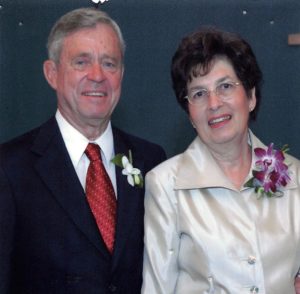

About two weeks before Dave had a serious fall, hitting his head, requiring brain surgery to deal with hematomas and bleeding. He sleeps, this godly, humorous, global citizen of the Kingdom of God in Christ. Janet is away for a break and it’s just the two of us.
(Honest to God: I pause because Dave just awoke and said, “Hello Bill!”. I’ll be back later.)
Shift gears in my changes…..
The prime reason for these transitions comes is marked by the conclusion last December 31, 2016, of my 30 years on the staff team of the Mission Commission, World Evangelical Alliance. But it really started with David.
The October MC 2016 Panama Global Consultation (theme—polycentric mission) celebrated and witnessed another well-done MC leadership transition, from Bertil Ekstrom (a decade serving) to David’s installation as executive director of the MC. That was the public announcement and it was a strong, diverse and healthy gathering.
I had started in that position (back then it was called executive secretary—and my first duty under chairman Theo William’s was to write the minutes of the MC gathering in Singapore that June 30, 1986) as a naive 46 old with zero knowledge of WEA. I had never heard the terms “network” or “networking” or “synergy partnerships”. But I learned. I was mentored by Dave Howard (Singapore) Theo Williams (India), Wade Coggins (USA), Stanley Davies (UK), Ray Windsor (New Zealand), Reuben Ezemadu and Panya Baba (Nigeria). And others.
(Fotos: Dave and wife Phyllis; documents and paper table mats from Singapore, June 1986; WEA 8th General Assembly).
I kept the paper place-mat in the Novotel Orchid Inn in Singapore that breakfast of June 29, 1986, with the very rough dimensions of this new position, names of the then ExCo, and a page from my calendar (the old Seven Star Diary format—pre-electronic stuff….and I have ALL the years of those dates! In my desk drawer!)
And as you see, I have a collected of diverse business cards that mark the seasons, changes of life and modified titles that supposedly gave me identity. I have no card from 1985-1990 (the four desert Russellville, AR years); perhaps I had none. The verticle one is my present one; my NGO ID.
My own MC leadership season came to its healthy conclusion in June 2006 in South Africa when Bertil assumed the position.
(Photos of South Africa 2006)
Last year’s transition from Bertil to David put me at a mature age 76. That’s three decades serving the MC. That a long time! One down-side of this new reality means that I no longer will see most of my colleagues and friends face to face, and this may be a loss in part for all of us. Community runs deep and cannot be created rapidly.
(Photos of Panama 2016)
I do continue as an MC Associate, with the privilege of making my annual contribution to keep that unique sea-going, community-network-alliance afloat, especially with David Ruíz as our skipper. In time he will build his crew to serve with singular creativity into the MC’s preferred future.
As I gaze into my own future I see the Hand of God, I see release, I see a new chapter, I see diminishing strength, I see myself down-shifting, I see medical offices, I see myself on the latter laps of the race, I see naps. God has indicated to me that I will not climb over this last mountain range set before me; rather, I have heard the Voice saying that I will rest at those foothills, for there and then I will have served my generation and then I shall “permanently change my own address”. I see a lot, so hang on until the next entry.
Part II next, retaking the narrative of change and mentors.
 This ceremony marked the beginning of this Sunday’s morning services, a serious time of repentance. It was sung-chanted, and as the procession wove it’s way through the rows of our worship center and congregation in an extended figure eight design.
This ceremony marked the beginning of this Sunday’s morning services, a serious time of repentance. It was sung-chanted, and as the procession wove it’s way through the rows of our worship center and congregation in an extended figure eight design.
My only comment is that when this finished, the entire congregation was quiet before the Lord and his people. It was powerful. I will be intrigued to see how many read through the entire Great Litany.
May God richly bless you in this Holy and Heavy Lent.
————-
Celebrant: Dear People of God: the first Christians observed with great devotion the days of our Lord’s passion and resurrection, and it became the custom of the Church to prepare for them by a season of penitence and fasting. Throughout the season of Lent, the faithful are called to bring to mind the message of pardon and absolution set forth in the Gospel of our Savior, and of the need which all Christians continually have to renew their repentance and faith. And now, as a mark of our mortal nature, let us kneel or stand before the Lord, our maker and redeemer.
O God the Father, Creator of heaven and earth,
Have mercy upon us.
O God the Son, Redeemer of the world,
Have mercy upon us.
O God the Holy Spirit, Sanctifier of the faithful,
Have mercy upon us.
O holy, blessed, and glorious Trinity, one God,
Have mercy upon us.
Remember not, Lord Christ, our offenses, nor the offenses
of our forefathers; neither reward us according to our sins.
Spare us, good Lord, spare thy people, whom thou hast
redeemed with thy most precious blood, and by thy mercy
preserve us, for ever.
Spare us, good Lord.
From all evil and wickedness; from sin; from the crafts
and assaults of the devil; and from everlasting damnation,
Good Lord, deliver us.
From all blindness of heart; from pride, vainglory,
and hypocrisy; from envy, hatred, and malice; and from all want
of charity,
Good Lord, deliver us.
From all inordinate and sinful affections; and from all the
deceits of the world, the flesh, and the devil,
Good Lord, deliver us.
From all false doctrine, heresy, and schism; from hardness
of heart, and contempt of thy Word and commandment,
Good Lord, deliver us.
From lightning and tempest; from earthquake, fire, and
flood; from plague, pestilence, and famine,
Good Lord, deliver us.
From all oppression, conspiracy, and rebellion; from
violence, battle, and murder; and from dying suddenly and
unprepared,
Good Lord, deliver us.
By the mystery of thy holy Incarnation; by thy holy Nativity
and submission to the Law; by thy Baptism, Fasting, and
Temptation,
Good Lord, deliver us.
By thine Agony and Bloody Sweat; by thy Cross and Passion;
by thy precious Death and Burial; by thy glorious Resurrection
and Ascension; and by the Coming of the Holy Ghost,
Good Lord, deliver us.
In all time of our tribulation; in all time of our prosperity; in
the hour of death, and in the day of judgment,
Good Lord, deliver us.
We sinners do beseech thee to hear us, O Lord God; and that
it may please thee to rule and govern thy holy Church
Universal in the right way,
We beesech thee to hear us, good Lord.
That it may please thee to illumine all bishops, priests, and
deacons, with true knowledge and understanding of thy
Word; and that both by their preaching and living, they may
set it forth, and show it accordingly,
We beseech thee to hear us, good Lord.
That it may please thee to bless and keep all thy people,
We beseech thee to hear us, good Lord.
That it may please thee to send forth laborers into thy
harvest, and to draw all mankind into thy kingdom,
We beseech thee to hear us, good Lord.
That it may please thee to give to all people increase of grace
to hear and receive thy Word, and to bring forth the fruits of
the Spirit,
We beseech thee to hear us, good Lord.
That it may please thee to bring into the way of truth all such
as have erred, and are deceived,
We beseech thee to hear us, good Lord.
That it may please thee to give us a heart to love and fear
thee, and diligently to live after thy commandments,
We beseech thee to hear us, good Lord.
That it may please thee so to rule the hearts of thy servants,
the President of the United States, and all
others in authority, that they may do justice, and love mercy,
and walk in the ways of truth,
We beseech thee to hear us, good Lord.
That it may please thee to make wars to cease in all the world;
to give to all nations unity, peace, and concord; and to
bestow freedom upon all peoples,
We beseech thee to hear us, good Lord.
That it may please thee to show thy pity upon all prisoners
and captives, the homeless and the hungry, and all who are
desolate and oppressed,
We beseech thee to hear us, good Lord.
That it may please thee to give and preserve to our use the
bountiful fruits of the earth, so that in due time all may enjoy
them,
We beseech thee to hear us, good Lord.
That it may please thee to inspire us, in our several callings,
to do the work which thou givest us to do with singleness of
heart as thy servants, and for the common good,
We beseech thee to hear us, good Lord.
That it may please thee to preserve all who are in danger by
reason of their labor or their travel,
We beseech thee to hear us, good Lord.
That it may please thee to preserve, and provide for, all
women in childbirth, young children and orphans, the
widowed, and all whose homes are broken or torn by strife,
We beseech thee to hear us, good Lord.
That it may please thee to visit the lonely; to strengthen all
who suffer in mind, body, and spirit; and to comfort with thy
presence those who are failing and infirm,
We beseech thee to hear us, good Lord.
That it may please thee to support, help, and comfort all who
are in danger, necessity, and tribulation,
We beseech thee to hear us, good Lord.
That it may please thee to have mercy upon all mankind,
We beseech thee to hear us, good Lord.
That it may please thee to give us true repentance; to forgive
us all our sins, negligences, and ignorances; and to endue
us with the grace of thy Holy Spirit to amend our lives
according to thy holy Word,
We beseech thee to hear us, good Lord.
That it may please thee to forgive our enemies, persecutors,
and slanderers, and to turn their hearts,
We beseech thee to hear us, good Lord.
That it may please thee to strengthen such as do stand; to
comfort and help the weak-hearted; to raise up those who
fall; and finally to beat down Satan under our feet,
We beseech thee to hear us, good Lord.
That it may please thee to grant to all the faithful departed
eternal life and peace,
We beseech thee to hear us, good Lord.
That it may please thee to grant that, in the fellowship of all the saints, we may attain to thy
heavenly kingdom,
We beseech thee to hear us, good Lord.
Son of God, we beseech thee to hear us.
Son of God, we beseech thee to hear us.
O Lamb of God, that takest away the sins of the world,
Have mercy upon us.
O Lamb of God, that takest away the sins of the world,
Have mercy upon us.
O Lamb of God, that takest away the sins of the world,
Grant us thy peace.
O Christ, hear us.
O Christ, hear us.
Lord, have mercy upon us. Kyrie eleison.
Christ, have mercy upon us. or Christe eleison.
Lord, have mercy upon us. Kyrie eleison.
When the Litany is sung or said immediately before the Eucharist, the Litany concludes here, and the Eucharist begins with the Salutation and the Collect of the Day.




